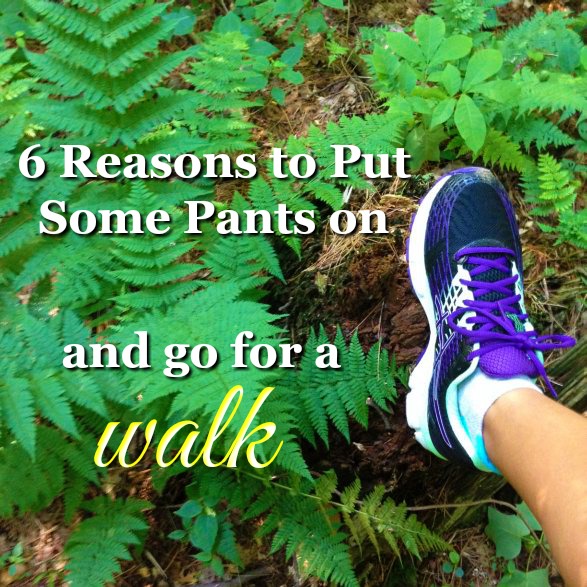Feel Better, Lose Weight: The Health Benefits of Walking
Posted by Robin on Apr 1, 2016 in Fitness & Health | 0 comments
Today’s National Walking Day. It’s also April Fool’s Day, which is a holiday that I think should be taken out to the barn and shot, but never mind about that. Here in southeastern PA today is gloriously sunny and in the low 70s; temps are forecasted to retreat into the 40s this weekend with a possibility of snow (SNOW!). There’s never been a better day for a nice, brisk walk.
Here, I present unto you the health benefits of walking and most pressing reasons to put on some pants and get outside:

Walking gets your blood flowing.
A recent Ball State study found that Americans generally spend 64% of waking hours in a sedentary position. Now, granted, Americans also don’t get enough sleep, so there’s not a lot of not-waking hours, but it’s still a sobering statistic. Even if you’re going to the gym after work every day for an hour of exercise, that isn’t enough to counteract the adverse effects of sitting all day long. While in a seated position, your lungs aren’t expanding fully, your circulation is compromised (it’s even worse if you have bad posture) and therefore the amount of oxygen being moved throughout your body is lessened. This means physical weakening and mental fuzziness.
Whenever you get the opportunity throughout the day, you should get up and walk around, stretch, do something to get that blood flowing to rejuvenate your mind and body.
You’ll live longer.
Physical activity lengthens our telomeres, the caps at the ends of chromosomes that are tied to aging and stress. On the flip side, a sedentary lifestyle is connected to increased mortality rates, from reasons spanning from colon and breast cancer (one study indicated those who were inactive were 40% more likely to die from their cancers) to insulin resistance to stroke and heart attack.
You’ll feel better.
Sedentary people are more likely to be depressed, although it’s hard to say whether being inactive leads to depression or if those who are depressed are less inclined to be active. However, there’s a good body of evidence showing that the endorphins produced from exercise helps to lift spirits, and that being out in nature lowers blood levels in the parts of the brain associated with rumination. In other words, going outside for a walk forces you out of your own head so that you’re not dwelling on the negative; in fact it can instead bring on a meditative state with all its positive effects.
You’ll be more creative.
Walking exposes us to new stimuli and allows our minds to wander: these unfettered thought and associations are the perfect prescription for creativity. Meanwhile, the exercise distracts the prefrontal cortex (right brain thinking) letting the left side of the brain take over a bit, plus it increases that blood flow to the brain, enlarging the hippocampus (which moves information from short-term to long-term memory). One Stanford study found that walking increased creative output by 60%!
You’ll probably lose weight over time.
For those who are currently sedentary or aren’t already committed to a weight loss regime, walking is a great place to start. It’s easy on the joints. It doesn’t involve any special equipment, upfront costs or new skills. It’s low pressure and not as intimidating as walking into a weight room or Zumba class. And for most people, it’s sustainable because it’s enjoyable: a chance to get out into the open air, bask in the sunshine, catch up with a friend.
If just walking doesn’t feel like a significant enough form of exercise to make a difference, consider this: for those with obesity who are trying to lose weight, the greatest health benefits come from losing just 5 percent of their body weight: according to a new study, that relatively small weight loss notably lowered risk for diabetes and cardiovascular disease. It also improved metabolic function in liver, fat and muscle tissue.
To get the most weight loss benefits from walking, you’ll want to keep the pace brisk and heart rate elevated. Also, try walking immediately after meals— it helps to slow digestion and improve your circadian rhythyms (messed up circadian rhythms can make it more difficult for your body to let go of fat). And yes, you will need to look at your calorie intake. All the walking in the world can’t overrule basic math.
It’s just nice.
It IS.
I know it’s so much easier to stay where you are. But going for a walk is such a simple pleasure. Why deprive yourself of that, especially when it’s so good for you?







